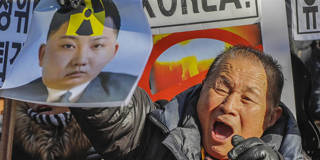Since last summer's agreement on Iran’s nuclear program, a promising new pattern of cooperation with the country has emerged. Now China and the US must apply the same commitment and cooperation to achieving a diplomatic breakthrough with another potentially volatile nuclear wannabe: North Korea.
DENVER – The diplomatic harvest from last summer’s agreement on Iran’s nuclear program has begun. When United States Navy boats drifted into Iranian waters this month – a development that, even just a year ago, probably would have triggered a crisis – they were detained only briefly. In the same week, Iran also released five American prisoners; exported enriched uranium, in accordance with the nuclear deal; and reentered world petroleum markets.

DENVER – The diplomatic harvest from last summer’s agreement on Iran’s nuclear program has begun. When United States Navy boats drifted into Iranian waters this month – a development that, even just a year ago, probably would have triggered a crisis – they were detained only briefly. In the same week, Iran also released five American prisoners; exported enriched uranium, in accordance with the nuclear deal; and reentered world petroleum markets.